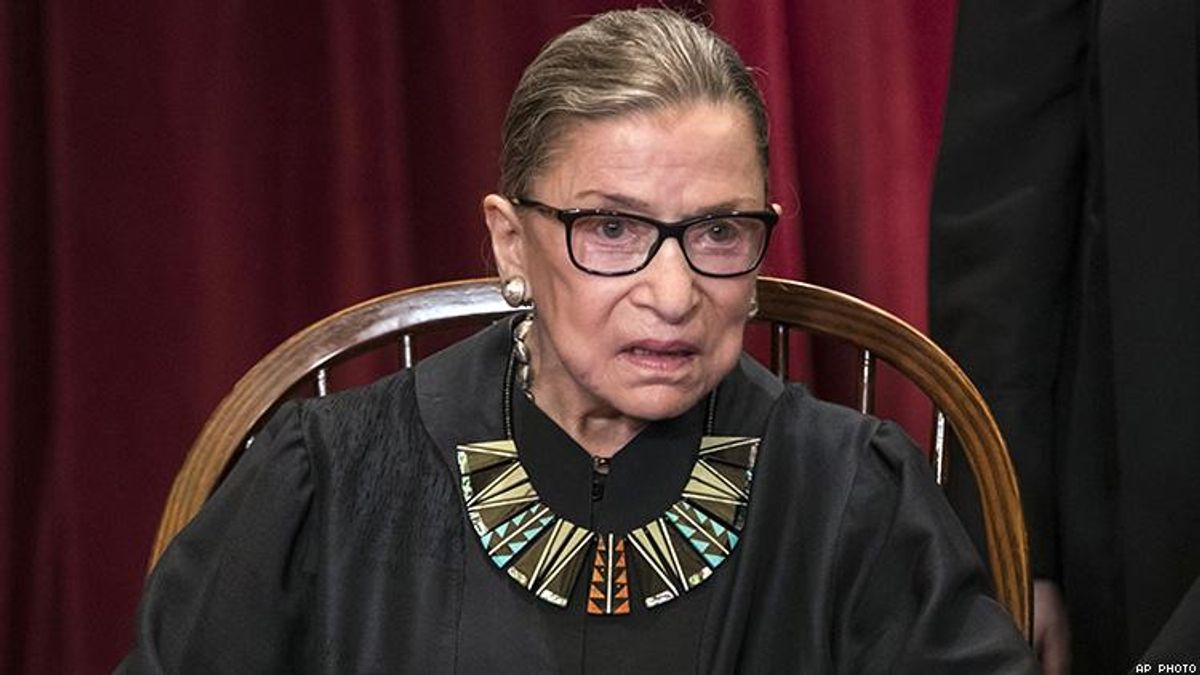Justice Ruth Bader Ginsburg delivered a spirited dissent to the Supreme Court's decision today in favor of a Colorado baker who refused to make a wedding cake for a gay couple in 2012, saying the baker indeed committed antigay discrimination.
The court, in a 7-2 decision, found that the Colorado Civil Rights Commission, in sanctioning baker Jack Phillips, failed to give his religious beliefs appropriate consideration.
The decision in Masterpiece Cakeshop, Ltd, v. Colorado Civil Rights Commission was tailor-made only for this case, with Justice Anthony Kennedy writing in the majority opinion that "laws and the Constitution can, and in some instances must, protect gay persons and gay couples."
Still, Ginsburg and Justice Sonia Sotomayor disagreed with the majority, with Ginsburg writing essentially in the dissent that her colleagues' logic was based on a false equivalency.
The majority of justices did not accept Phillips's claim that his cake-baking is a form of constitutionally protected free speech. But they did find that the commission went too far and was in fact "hostile" to his religious beliefs when it ruled that Phillips violated Colorado's antidiscrimination law by refusing to bake a wedding cake for Charlie Craig and David Mullins, citing his religion as the reason. Kennedy wrote in the decision:
"To Phillips, his claim that using his artistic skills to make an expressive statement, a wedding endorsement in his own voice and of his own creation, has a significant First Amendment speech component and implicates his deep and sincere religious beliefs." Phillips "was entitled to a neutral and respectful consideration of his claims in all the circumstances of the case. That consideration was compromised, however, by the Commission's treatment of Phillips' case, which showed elements of a clear and impermissible hostility toward the sincere religious beliefs motivating his objection. As the record shows, some of the commissioners at the Commission's formal, public hearings endorsed the view that religious beliefs cannot legitimately be carried into the public sphere or commercial domain, disparaged Phillips' faith as despicable and characterized it as merely rhetorical, and compared his invocation of his sincerely held religious beliefs to defenses of slavery and the Holocaust."
The high court relied on other bakery-related cases to arrive at its decision, ruling that the commission failed to treat Phillips as it had other bakers who refused to make cakes with messages they found offensive.
In three of those other cases, bakers were asked to create Bible-shaped cakes, some with Scripture, and with the words "homosexuality is a sin" inscribed on them. In one case, the baker was asked to create an image of two groomsmen in a red circle with a line drawn through it to indicate same-sex marriages weren't allowed. In those cases, the commission did not sanction the bakers, a fact the majority used to help arrive at its ruling in favor of Phillips.
However, Ginsburg, in her dissent, saw flawed reasoning in her colleagues' decision based on the fact that the bakers in those other cases refused to participate in messages of hate, whereas Phillips was asked simply to bake a cake that could have been made for any couple, whether opposite-sex or same-sex. She wrote:
"Phillips declined to make a cake he found offensive where the offensiveness of the product was determined solely by the identity of the customer requesting it. The three other bakeries declined to make cakes where their objection to the product was due to the demeaning message the requested product would literally display, ... When a couple contacts a bakery for a wedding cake, the product they are seeking is a cake celebrating their wedding -- not a cake celebrating heterosexual weddings or same-sex weddings -- and that is the service Craig and Mullins were denied." .
Lawyers for Phillips contended that he did not unilaterally discriminated against LGBT people -- for instance, he wouldn't have declined to sell them premade baked goods such as cookies. But Ginsburg shredded that argument.
"The fact that Phillips might sell other cakes and cookies to gay and lesbian customers was irrelevant to the issue Craig and Mullins' case presented," Ginsburg wrote. "What matters is that Phillips would not provide a good or service to a same-sex couple that he would provide to a heterosexual couple."


















































































